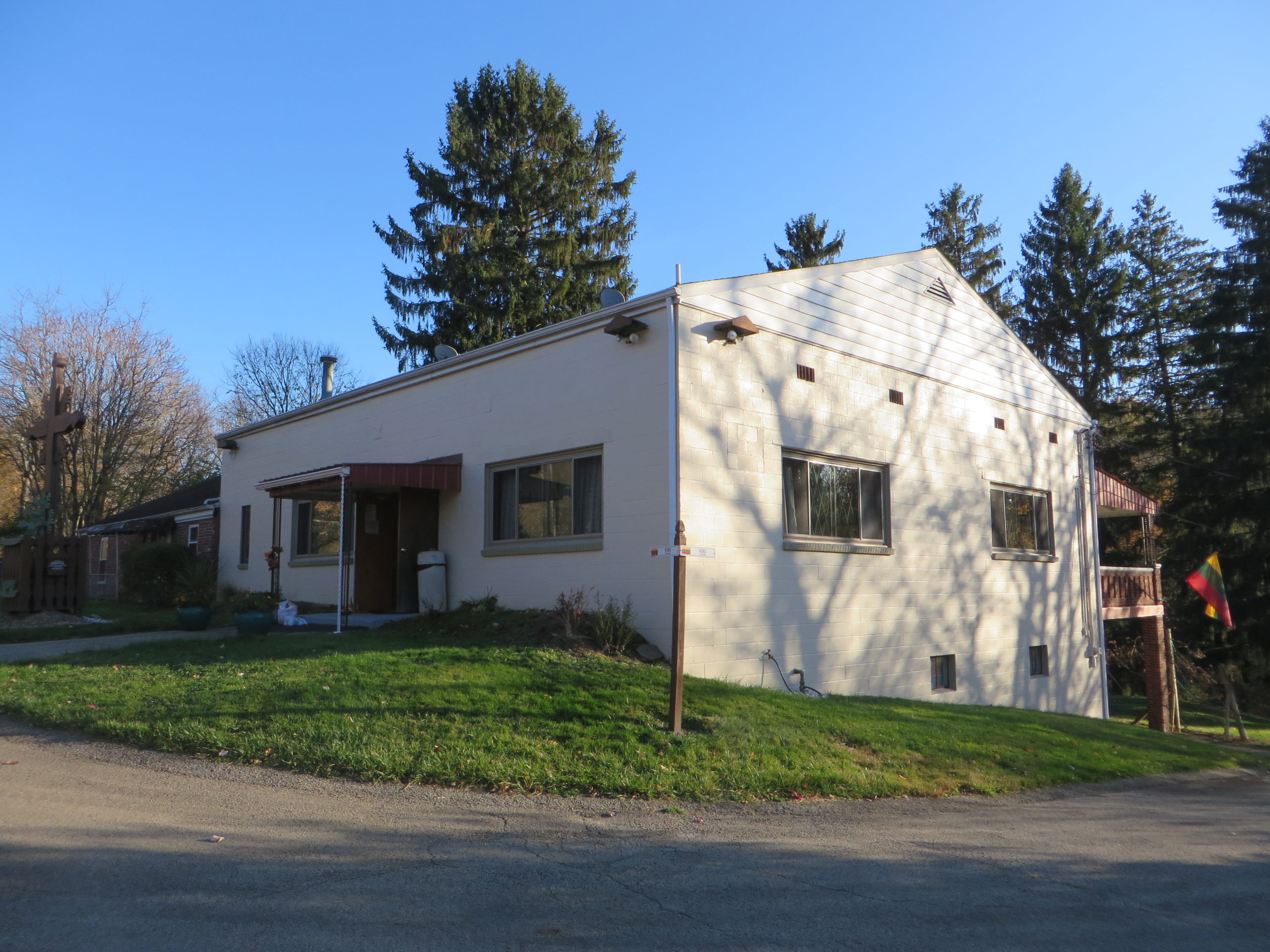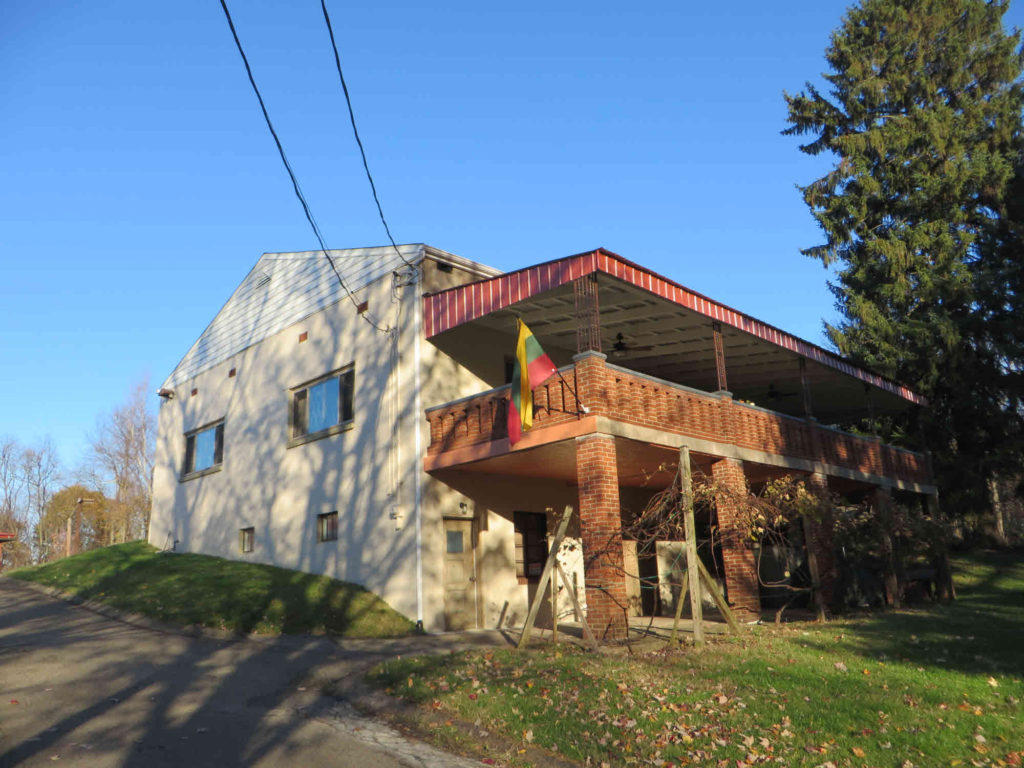History
A Club in the Country
The Citizens’ Society permanent location is now 904 Coal Valley Rd. in Jefferson Hills, approximately 8 miles southeast of Downtown Pittsburgh and just off of Route 51. This rural “Clean & Green” site features picnic grounds and a wooded area formerly known as the “Lithuanian Country Club.” The name has more to do with the location (it’s out in the country) rather than any posh facilities or golf course! The Lithuanian Country Club was once an independent entity and boasted several hundred of its own members. In the early 1990s, because of dwindling membership, it merged with the Citizens’ Society. Today, the buildings and grounds are used for member picnics and cultural activities such as our annual Jonines celebration, September pig roast and Oktoberfest, and Kucios. The property features a rustic barn (legend has it that the famous Lithuanian pilots, Darius and Girenas slept there), a small clubhouse, office space and storage. There is plenty of grassy open space for activities and you probably can see some deer or wild turkey roaming the grounds most days.


History of the Lithuanian Country Club - Home of the Lithuanian Citizens' Society of Western PA
The Club was started in 1927. In the 1920’s the present Clairton Rd. was Rt 51, the main route from Pittsburgh to Elizabeth, Uniontown, and Connellsville. Some of the Lithuanians who traveled the road frequently stopped at the roadside stands, and they stopped at Rockensus Blacksmith Shop at the corner of the present Old Clairton Rd and Coal Valley Rd. George Rockensus was the grandfather of the Christofels, who still live on the plot.
Some of the men who stopped at the blacksmith shop could smell in the air the fragrance of mushrooms, a Lithuanian delicacy. when the asked the old farmer if they could pick mushrooms, he said “go ahead, my cows won’t eat them.” Sometiems they woudl buy milk and other items from the farmer.
They stopped often and while talking to farmer Lauderbaugh they suggested that he ought to make some improvements. He told them that had to move from his farm, because it was now South Park, and that he didn’t own the farm, but it belonged to his relatives, the Rankins, and he did not have to pay rent. The Lithuanians suggested that maybe they could buy the farm and he could live on it, and Mr. Lauderbaugh agreed.
So the Lithuanians bought the farm for $1,700 and back taxes. Some of the Lithuanian businessmen who put up the money were Pete Pivarunas, a baker; Stanley Simon and Joe Pakrosnus, brothers-in-law, who were butchers, Anton Katilius, a jeweler; Frank Gedris, a pop bottler of White star Beverages, and several others.
They called it the Lithuanian Businessmen’s Farm, but in 1935 when they wanted to get a liquor license, they decided to call it the Lithuanian Club in the Country. Then it got turned around to be the Lithuanian County Club of Allegheny County.
The first address was Willock, PA, and the place was referred to as the Lithuanian Businessmen’s Farm of Willock, PA as late as 1947. The men would come on Saturday and Sunday to play cards, drink, get drunk, and sleep in the hayloft, something they did as youths in Lithuania.
Two of the successful members, the baker Pete Pivarunas and the butchers, Pakrosnus and Simon, built two cottages where they would bring their families. Other Lithuanian clubs were located on the South Side, McKees Rocks, Esplen, Bentleyville, and Vandergrift. The latter two still operate, while the group that owned the South Side Club, the Lithuanian Citizens’ Society of Western PA, took over operation of the Country Club after a merger in the early 1990’s and eventually sold their location on the South Side and moved all operations to the Country Club. Other clubs in Soho, Donora, Glendale, Wilmerding, two on the North Side, plus clubs in Lawrencville, Homestead, Duquesne, Ambridge and Braddock have all closed.
The original purchase for the club on Coal Valley Road consisted of about 71 acres, and 8 acres were added later. Due to financial struggles, various parcels have been sold throughout the years, including one that now comprises the Oakwood neighborhood. Approximately 35 acres remain, with roughly half on each side of Coal Valley Rd. There are three veins of coal under most of the club property that have been extensively mined.
History of the Lithuanian Citizens' Society of Western PA
The charter for the Lithuanian Citizens Society was granted in October of 1912. Grajauskas, Woshner, Stravinskas, Marcukonis, Braciulis, Miliauskas, Milasauskas – those are the family names of the members who signed the charter creating the Lithuanian Citizens’ Society of Western Pennsylvania.
Depending on which century-old documents you look at, the society was founded in either 1911 or 1912. The society was created to support and preserve the ethnic and cultural heritage of Lithuanian Americans, to give financial aid in case of sickness, and to provide mortuary benefits to the organization’s members. As the need arose, the Society provided the Lithuanian community with a meeting place for educational, cultural and recreational activities.
The Society began life at 2025 Jane Street on Pittsburgh’s South Side. Just a year later the society moved further west and across the street to 2226 Jane Street. This information about the society’s early years comes from a booklet produced for the 45th anniversary banquet.
“In those days, there were three Lithuanian organizations on the South Side,” according to the booklet. Organizations named the Teodoro Narbuto, the Auksciousios Prieglaudes, and The Lithuanian Citizens’ Society all operated independently until 1927.
It was in that year that the three organizations merged, retaining the name of Lithuanian Citizens’ Society. Those were years of hope, expansion and growth. The following year, just before the start of the Great Depression, the membership voted unanimously to acquire the Birmingham Turner Hall at 1725 Jane Street, where they were located for over 80 years.
Pittsburgh’s South Side probably had the largest and most prosperous Lithuanian-American community in southwestern Pennsylvania in those days, but there were Lithuanians and Lithuanian clubs, churches and schools in many other parts of Pittsburgh and the region.
The 1956 anniversary booklet has advertisements for many Lithuanian businesses. They included Mary Savickas’s Carson Café, casket maker John Gedris, Katilius furniture, Frank Wenslovas funeral home, A.L. Wenslovas funeral home, Peter Jurgaitis’s Liberty Hall bar, and Viola Stanny’s Vi’s Bar & Grill. Vi helped us celebrate the Society’s 100th anniversary and was an active member of the Society until she passed away a few months short of her own 100th birthday.
Most Lithuanian-Americans in Pittsburgh are the descendants of immigrants who arrived between 1890 and the start of World War I. They came to be coal miners and steel workers. What courage those men and their wives had. They left the economically poor, but beautiful Lithuanian countryside to work deep underground or in hellishly hot steel mills. They were peasants and laborers, but they wanted more for their children and grandchildren.
The Second World War brought some new arrivals. Some current members were part of that second wave. Some of their sons and daughters also eventually became members.
There was a rich cultural life for Lithuanian-Americans in Southwestern Pennsylvania. There was even one group – The United Lithuanian Organizations of Western Pennsylvania — whose job it was to coordinate the multitude of activities at ethnic clubs and societies.
The Lithuanian Hall on the South Side was at the center of many of those events. The bar, which at one time was supposedly recognized as the longest one in Pennsylvania, was open regular hours. There were dances, weddings and even union meetings in the ballroom. There were once bowling alleys downstairs. The hall appeared in two Hollywood movies: Gung Ho and Love and Other Drugs, and served as a catering location for other movies filmed on Pittsburgh’s South Side. Language classes were organized to help second- and third-generations keep alive the ancient Lithuanian tongue.
Lithuanians are dancers and singers. For 45 years, the South Side was home to the Neris Dancers. The Neris Dancers performed at the Pittsburgh Folk Festival for decades. The local troupe also took part in the International Lithuanian Folk Dance Festivals. The dance group was revived again in 2019 to participate in the now 2022 Lithuanian International Dance Festival in Philadelphia.
The Society has also been home to the Pittsburgh Council 19 of the Knights of Lithuania. Although less active in recent years, the council still exists and cooperates with other organizations like the Sisters of St. Francis.
As members of the society have aged, the society has had trouble attracting new members. They have been helped by the arrival of young Lithuanians during the third wave of immigration over the last 3 decades. However, that wave did not bring as many immigrants to Pittsburgh as other Lithuanian communities.
This Lithuanian Hall on the South Side was the staging ground for innumerable local, state and national demonstrations that made sure that Pittsburgh residents and political leaders never forgot that between 1940 and 1989 Lithuania was a Captive Nation. Those protests and marches played a small, but important role in keeping alive the idea of Lithuanian independence. And when independence came, this society donated materials and money to new Lithuanian institutions. The society paid special attention to the needs of children –especially the handicapped and orphans. By rough count, this society donated more than $350,000 to Lithuanian and Lithuanian-American causes over a short 5-year period beginning in 1994.
The club survived financially by holding a bingo for well over 40 years. At one time, the bingo seemingly filled every square inch of their building 2 nights a week and was the largest in Allegheny County. It allowed the society to pay its bills and helped support cultural programming. When the Lithuanian National forensics team came to Pittsburgh, this club sponsored a city tour, a visit to Pitt’s Nationality Rooms and meal on Mt. Washington. Those young people – who will be the future leaders of Lithuania – will never forget Pittsburgh and the Lithuanian Citizens’ Society.
But the bingo is gone and the society is retrenching. It eventually became property rich and cash poor. However, that does not mean that the Society and its members are not active.
In the last decade, the Society sponsored a new singing group called “Bociai,” which performed at the Pittsburgh Folk Festival and at events sponsored by the Nationality Rooms at the University of Pittsburgh. By doing so, they assured that Pittsburgh’s Lithuanian community continued to be represented with a cultural booth and a performance group for the 55th time at the folk festival. The society is one of the original participating groups and have never missed a festival, thanks to the support of the club and the hard work of so many members.
The society has sponsored concerts over the years by groups from Lithuania. They have included the folk groups Saule – 2 times, Sutaras and Aitvaras, plus the children’s choral group Rokoko.
The interior of the building on the South Side appeared in two Hollywood movies: Gung Ho (site of the union meetings) and Love and Other Drugs (site of a pharmaceutical convention), as well as the exterior appearing in an additional movie, Inspector Gadget. In fact, South Side Lithuanian sites have hosted scenes from the films Flashdance and Dominic and Eugene as well.
The society has held an annual Jonines celebration for over 20 years and 10 years ago began to hold an annual pig roast. The Society has sponsored cultural activities such as Lithuanian cooking classes and egg decorating, as well as an annual celebration of a traditional Lithuanian Kucios for many decades.
The Lithuanian Citizens’ Society of Western PA is over 100 years old. Its members remain hopeful that they will continue to keep alive Lithuanian culture and pass it down for the next generation.

